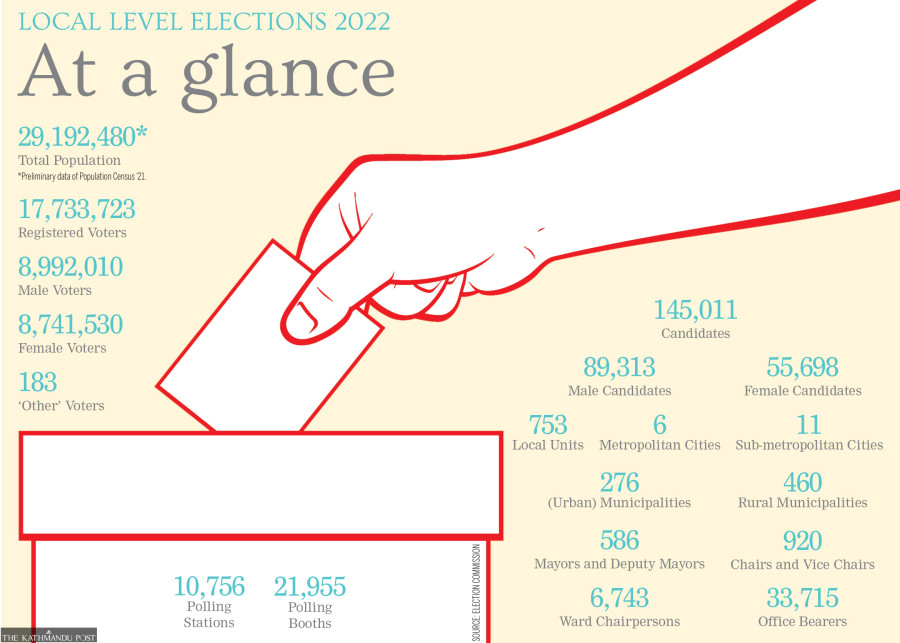National
Nepal polls: Go vote for grassroots democracy
17.73 million people are voting today to elect over 35,000 local representatives for 753 local units.
Binod Ghimire
Nepal is voting on Friday to elect people’s representatives to govern 753 local governments across the country for the next five years. This is the second time people are voting in local elections after the promulgation of the constitution in 2015 and fourth time since the restoration of democracy in 1990.
Friday’s local elections hold significance as these will mark the first periodic polls, which are the hallmark of democracy, of the federal republic.
The 2017 local elections were held after a gap of 20 years. However, the country is holding the elections now exactly after five years.
Nepali politicians’ squabbling and haggling in the lead up to the elections may have made some people disenchanted, but that the elections are finally taking place is a step towards strengthening grassroots democracy, observers and analysts say.
“Timely elections are the backbone of democracy. It is good that the country is voting on Friday despite speculations until a few weeks back that it could be postponed,” Meena Vaidya Malla, a professor and former chief of the Department of Political Science at the Tribhuvan University, told the Post.
After years of struggle, Nepal, a unitary state ruled by the Shah dynasty, was restructured in a bid to improve governance, development and quality of services to the people. Accordingly, three tiers of government were envisioned—starting with one federal at the centre, seven at the provincial level and 753 at the local level.
Political experts say local elections are important because it is the local governments that connect the state with the people.
And it is through the local governments the state delivers its services to its people. The constitution has bestowed 22 explicit authorities upon the local government which are directly linked with the day to day lives of the general public.
Experts say in federal Nepal all three tiers of government are parallel, functioning autonomously based on the jurisdiction set by the constitution.
“Local elections, therefore, are important in strengthening federalism,” Daman Nath Dhungana, a former Speaker and civil society member, told the Post. “This will also give momentum to two other elections supposed to be held later this year.”
According to Dhungana, in a democracy citizens elect their leaders to govern the country and periodic elections are the occasions to hold them accountable.
People uphold the leaders and parties by re-electing them if they have worked for their betterment. If not, people penalise them by voting against them and replacing them with other leaders and parties.
It’s for the fear of losing during the next elections that the people’s representatives work for the people during their five-year term, according to experts.
The CPN-UML had emerged as the largest party from the 2017 local elections, winning in 41 percent of local units while the Nepali Congress and the CPN (Maoist Centre) had secured the second and the third positions by registering victory in 32 and 14 percent of local federal units respectively.
The country’s political scene has changed significantly in the last five years.
The UML has split into two, of which the breakaway party, the CPN (Unified Socialist) led by Madhav Kumar Nepal, is part of a rival alliance.
The Congress, the Maoist Centre, the Unified Socialist, the Janata Samajbadi Party and the Rastriya Janamorcha have formed an electoral alliance competing jointly against the UML. The party has also joined hands with some fringe forces like the Rastriya Prajatantra Party Nepal and the Pariwar Dal in some of the local units.
“The 17.73 million voters on Friday will decide who to reward and who to penalise,” said Dhungana. “This is the most beautiful aspect of democracy.”
Over 35,000 representatives—mayors/chairperson, deputy mayors/ vice-chairpersons, ward chairpersons and ward members—will be elected by 17,733,723 voters registered for the local elections.
While experts welcome the timely elections, they say the way the parties are treating local elections shows they haven’t understood the true spirit of these polls. They say formation of the alliance in the local election itself is a wrong practice which is going to confuse the voters hugely.
When the parties contest the elections forming an alliance, one party will have candidates in a couple of positions among the seven while other parties will have candidates in other positions though their election symbols will be on the ballot paper for all the positions. The voters will have to remember the candidate and his/her separate election symbols.
“The confusion will increase the number of invalid votes,” said Dhungana. He said that he is also worried to see the way parties are using money and power to win local elections.
“The way the parties have behaved has made us think if the country should adopt a party-less local election system,” said Dhungana.
Observers say there has been unhealthy competition among parties. According to them, the Election Commission has done precious little to put the parties on check.
“The commission has limited itself to seeking clarifications,” Pradip Pokharel, chairperson of the Election Observation Committee, Nepal, told the Post. “Had the Election Commission taken stern measures in the cases of code of conduct violations, it would even be instrumental in ensuring fair provincial and federal elections.”
Khagendra Prasain, who teaches political philosophy at the Nepal Open University, says local elections are different from two other tiers of election, as they give communities a chance to have their say in how they want to be governed and what the actual local needs are.
“The significance of local elections is they help strengthen grassroots democracy,” Prasain said. “Timely elections make grassroots democracy vibrant. Its importance is even bigger in a country like ours where local governments have huge constitutional authorities.”




 19.12°C Kathmandu
19.12°C Kathmandu














